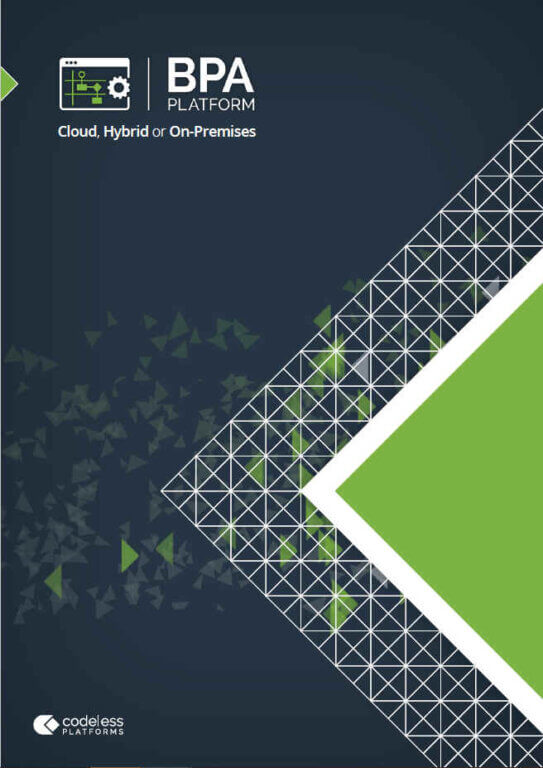Many businesses are rapidly adopting cloud-based solutions and utilising the power of data in their digital transformation strategies, and integration as a service (IaaS) has emerged as a crucial component, facilitating seamless connectivity and data flow between various applications, systems and services.
The adoption of this type of integration model offers enterprises a flexible, scalable and cost-effective approach to streamline their operations, enhance collaboration and drive innovation. It also provides VARs with a new integration offering and the ability to explore new revenue streams.
In this blog, we delve into the principle of integration as a service, its significance to both customers and VARs, its benefits, and the evolving landscape of modern integration solutions.
What is integration as a service?
Not to be confused with infrastructure as a service, integration as a service (IaaS) is a cloud-based model that provides integration capabilities as a service to enable seamless connectivity and data exchange between disparate systems, applications and services.
Integration as a service models are typically offered by VARs and integration specialists enabling them to offer their customers access to integration capabilities, such as pre-built connectors, APIs and tools, without the need for the customer to deploy extensive on-premises infrastructure investments, maintenance or custom development.
The integration as a service model typically encompasses a range of integration capabilities, including:
- Data Synchronisation: Integration as a service offerings facilitate the synchronisation of data between various data sources, ensuring consistency and accuracy across different systems and applications.
- Connectivity and Interoperability: Integration as a service promotes connectivity and interoperability by providing standardised protocols and formats for data exchange, ensuring compatibility and seamless communication between diverse systems and environments.
- Real-Time Data Exchange: IaaS facilitates real-time data exchange between systems and applications, enabling organisations to access and utilise up-to-date information for decision-making, analytics and reporting purposes.
- Event-Driven Architecture: IaaS supports event-driven integration patterns, allowing organisations to design workflows and processes that respond to real-time events and triggers, thereby enabling agile and responsive business operations.
- Workflow Automation: Integration as a service solutions enable the automation of business processes and workflows by orchestrating the flow of data and activities across different systems, reducing manual effort and improving efficiency.
- API Management: Integration as a service offers API management capabilities to create, publish, secure and monitor APIs, enabling organisations to expose their services and data to internal and external stakeholders in a controlled and secure manner.
- Monitoring and Management: IaaS solutions offer monitoring and management tools to track the performance, reliability and availability of integrations, enabling organisations to proactively identify and address issues to ensure uninterrupted business operations.
Integration as a service models provide organisations with a flexible, scalable and cost-effective approach to integration, enabling them to overcome the complexities and challenges associated with traditional integration methods and accelerate their digital transformation initiatives.
What is the difference between integration as a service and iPaaS?
Integration as a service and integration platform as a service (iPaaS) are both cloud-based solutions for facilitating application integration, but they operate differently.
iPaaS is simply an integration platform provided by vendors that is hosted in the cloud, that either end users, a VAR or an integration specialist will need to install and manage. Quite often the end user will be responsible for creating their own integrations and workflows.
iPaaS solutions include features like data mapping, transformation, workflow orchestration, and monitoring, providing a robust and flexible solution for businesses needing sophisticated integration capabilities.
Integration as a service, however, means that the end user does not get involved at all, and all the integration services and infrastructure are provided and hosted by the VAR or integration specialist. These days, an iPaaS solution will usually be included in the service offering and the provider will build, manage and maintain all of the integrations and workflows.
What are the benefits of integration as a service?
Going down the integration as a service route has many benefits for end-users looking to integrate their business systems, including:
- Reduced Complexity: Outsourcing and removing the underlying complexities of integration simplifies the development, configuration and management of system integration, enabling organisations to concentrate on other aspects of the business.
- Flexibility and Customisation: Integration as a service offers a range of integration possibilities and deployment options, allowing organisations to request tailored integration workflows to their specific requirements and business processes.
- Scalable Ecosystem Integration: Integration as a service facilitates the integration of a diverse ecosystem of applications, services and endpoints, enabling organisations to create interconnected ecosystems that drive innovation and digital transformation.
- Improved Collaboration: Integration fosters collaboration across departments, partners and stakeholders by providing a unified solution for data sharing, collaboration and decision-making.
- Real-time Insights and Analytics: Integrating disparate data sources in real-time enables organisations to gain actionable insights, perform advanced analytics and make data-driven decisions to drive business growth and innovation.
What does integration as a service mean for customers?
For customers and end users, integration as a service facilitates seamless connectivity between on-premises and cloud-based systems, transcending geographical boundaries to enable seamless data exchange across diverse environments. This uninterrupted connectivity lays the foundation for agile and scalable business operations.
Agility is paramount in today’s environment, and integration as a service empowers businesses to swiftly respond to evolving market demands by scaling integration resources on-demand. This flexibility ensures optimal performance and resource utilisation, allowing businesses to remain competitive and responsive to customer needs.
Moreover, integration as a service offers a compelling cost-effective solution. By removing the need for substantial upfront investments in hardware, software licenses and infrastructure maintenance, it presents clients with a predictable subscription-based pricing model. This predictability allows for better budgetary planning and cost control, freeing up resources for strategic initiatives.
Time-to-market is another critical metric in today’s fast-paced business environment. Integration as a service accelerates this process by providing pre-built connectors, templates and APIs. Using these resources, businesses can accelerate the development and deployment of integrations, swiftly bringing new products and services to market.
IaaS also provides peace of mind when it comes to risk. Providers adhere to stringent security protocols and compliance standards, safeguarding data integrity, confidentiality and regulatory compliance throughout the integration lifecycle. This commitment to data protection instils confidence in businesses and their stakeholders, mitigating risks associated with data breaches and non-compliance.
Integration as a service offers not just technical connectivity but also strategic advantages in agility, cost-effectiveness, time-to-market, and data security. Its holistic approach to integration empowers clients to navigate the complexities of the digital landscape with confidence, enabling growth, innovation, and resilience in an ever-evolving market environment.
BPA Platform Brochure BPA Platform FAQ
How does integration as a service benefit value-added resellers?
Integration as a service (IaaS) presents a transformative opportunity for value-added resellers (VARs) in the technology ecosystem. For VARs, whose primary focus is on providing added value to their clients through technology solutions, integration as a service represents a powerful solution that can enhance their service offerings, streamline operations and drive business growth.
Incorporating integration as a service into their portfolios enables VARs to significantly enhance their service offerings, expanding beyond traditional hardware and software sales to offer comprehensive end-to-end solutions encompassing consultation, implementation, and ongoing support for integrated systems.
This means having the ability to easily integrate their clients’ existing systems with new technologies, applications or services, without the need for the customer to worry about extensive development or infrastructure investments.
This flexibility allows VARs to customise solutions to meet the unique requirements of clients across different industries, addressing various integration challenges.
By offering iPaaS within an integration as a service offering, VARs can tailor solutions to meet the unique and specific needs of their clients by using the diverse array of integration patterns, connectors and customisation options.
This includes the ability to offer point solutions to address specific tasks or full blown end-to-end solutions that can streamline an entire business process, from start to finish. This provide VARs and customers with the scope to enjoy economies of scale.
Deploying point solutions enables both VARs and customers to target specific bottlenecks or pain points, creating micro transactions or automating data tasks, quickly and cost efficiently. Once in place, they can then be expanded to incorporate further data tasks or workflows.
This adaptability allows VARs to navigate and address the varied integration challenges present across different industries and verticals with ease.
Furthermore, the utilisation of cloud-based infrastructure in integration as a service facilitates scalability without imposing prohibitive upfront costs. VARs can seamlessly adjust integration resources in response to fluctuating client demands, ensuring optimal resource utilisation and cost-efficiency. This scalability feature is particularly invaluable in meeting the evolving integration needs of clients as their businesses grow and change over time.
By embracing integration as a service, VARs also gain a distinct competitive advantage. They can distinguish themselves from competitors by offering holistic solutions that comprehensively tackle clients’ integration hurdles. This differentiation elevates VARs’ standing in the market and cements their relationships with clients as trusted technology partners.
The integration projects facilitated by integration as a service not only open avenues for one-time revenue but also present recurrent revenue opportunities. Maintenance, support and optimisation services associated with these projects generate ongoing revenue streams for VARs. Additionally, VARs can monetise integration as a service through subscription-based pricing models, consultancy fees and value-added services, further bolstering their revenue streams.
Moreover, the streamlined operations afforded by IaaS streamline development, deployment and management of integrations, minimising time-to-market for new solutions. This operational efficiency enables VARs to deliver projects faster and more cost-effectively, all while upholding high-quality standards.
Ultimately, the seamless integrations facilitated by IaaS translate into enhanced customer satisfaction and loyalty. By improving business processes, enhancing data visibility, and facilitating better decision-making for clients, VARs foster enduring relationships built on tangible value and return on investment (ROI).
Integration as a service becomes not just a technical solution but a means for VARs to cultivate long-term partnerships based on mutual success.
“We immediately moved over to the multi-tenant environment as soon as it was available. As we were in control of the server we could host all of our customers on it knowing that we’re not all sharing the same thing; it’s all separated thanks to the different instances within it. BPA Platform 2024 has made things a lot easier in terms of managing when tasks are running etc via the multi-tenant environment that is now included. I think it’s interesting the way Codeless Platforms has developed BPA Platform and the multi-tenancy because that ultimately makes it a lot more economically viable.” Dan Clibbens, Operations Director, Percipient
Download Partner Focus
The evolving landscape
As businesses continue to embrace cloud-native technologies, AI-driven automation, and hybrid integration architectures, integration as a service will evolve to meet the growing demands for agility, scalability and innovation. Emerging trends such as event-driven integration, serverless computing and AI-driven insights will shape the future of integration, empowering organisations to harness the full potential of their data assets and drive digital transformation initiatives.
In conclusion, integration as a service represents a paradigm shift in the way organisations can approach integration, offering a holistic, cloud-native solution to connect, orchestrate and optimise their digital ecosystem. By embracing integration as a service, businesses can unlock new opportunities for innovation, collaboration and growth.
For more information on the benefits of integration as a service and automating business processes, and how they can help your business, download the brochure below or call us on +44(0) 330 99 88 700.


